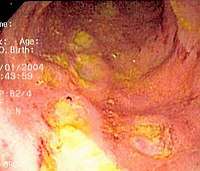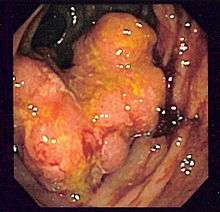Philip Augustine
Philip Augustine, an Indian gastroenterologist, specialist in gastrointestinal endoscopy and a hospital administrator from Ernakulam, Kerala.[1] He founded the Lakeshore Hospital and Research Centre in 2003, one of the largest multispeciality hospitals in south India.[2] The Government of India honoured him with the civilian award, Padma Shri, in 2010, for his services to the fields of medicine.[3]
Philip Augustine | |
|---|---|
| Born | |
| Occupation | Gastroenterologist |
| Children | Dr.Cyriac Abby Philips,
Minna Philips, Augustine Nebu Philips, Anna Amy Philips. |
| Awards | Padma Shri |
| Website | www |
Biography
Philip Augustine was born in Kaduthuruthy, a small hamlet in Kerala.[5] Choosing medical profession, he secured his MD from the All India Institute of Medical Sciences, in 1975, with a Gold Medal.
Augustine started his professional career at a small clinic in the town of Koothattukulam.[5] Later, he specialised in Gastroenterology and had advanced training in ultrasonography and endoscopy at various centres across the globe such as Wisconsin Medical College, Milwaukee, USA,[6] Eppendorf University, Hamburg, Germany, Hospital Beuton, Paris and University of Marseilles, France, Bern University in Switzerland and ULM University, Munich, Germany.[4] His career took a turn when he joined Devamatha Hospital,[7] Koothattukulam where he established a speciality gastroenterology department which now serves as a referral centre in Kerala. Later, he moved to PVS Memorial Hospital[8] in Ernakulam to address a wider canvass of patients.[5]
In 1996, Augustine joined hands with a group of doctors and launched the work on the Lakeshore Hospital and Research Centre. The hospital was opened to public in 2003.[9]
Augustine is married, has four children and presently lives in Palarivattom, Kochi, Kerala.[10]
Legacy


The primary contribution of Augustine is the hospital he found in 1996, along with a bunch of doctors and businessmen, the Lakshore Hospital and Research Centre, which became operational in 2003. The hospital, has, over the years, grown to become one of the leading multi speciality health care centres in Kerala[9] and is stated to have several firsts to its credit.[1][6] The hospital is certified by the National Accreditation Board for Hospitals and Healthcare providers.[5]
- First living donor liver transplant in Kerala[6]
- First insulin pump insertion surgery in South India[6]
- First metal on ceramic knee replacement surgery in Asia[6]
- First Spyglass Cholangioscopy and pancreatoscopy in Kerala[6]
- First to introduce double balloon enteroscopy in Kerala[6][11]
- First to introduce wireless capsule endoscopy in Kerala[6]
- First peripheral stem cell transplantation in Kerala[6]
- Third centre in the world to perform key hole surgical transplantation of kidney[6]
Besides, Augustine is credited as the first to report on Crohn's disease in the country in 1995, which he submitted at the national conference of the Indian Society of Gastroenterology. he also led a team of doctors who first reported Recurrent Pyogenic Cholangites or Oriental Cholangiopathy in India.[5]
Positions
- President – Indian Pancreas Club[1]
- managing director, Lakeshore Hospital and Research Centre[2]
- Medical Director and Chief – Digestive Disease Centre, Lakeshore Hospital and Research Centre[1]
- Chairman – Healthcare sub-committee of the Confederation of Indian Industry (CII) – Kerala Chapter[5]
Awards and recognitions
- Padma Shri – 2010
- Olympus-Mitra Endoscopy Award – Indian Society of Gastroneterology – 1994[1]
- Dr. P. A. Alexander Memorial Oration Award – IMA Academy of Medical Specialities – 1999[1]
- Dr. V. C. Mathew Roy Memorial Oration Award – Association of Physicians of India – 2001[1]
- Outstanding Entrepreneurship Award – Kerala State Industrial Development Corporation (KSIDC) – 2011[1]
Publications
Augustine has published a book on bowel diseases which serves as a reference book on the subject.
- Philip Augustine (2012). Inflammatory Bowel Diseases – ECAB. Elsevier Health Sciences. ISBN 9788131231913.
He has also published several scientific journals and has contributed chapters on pancreasis in medical text books.[1]
See also
References
- "LS credits". Retrieved 22 July 2014.
- "Lakeshore". Retrieved 22 July 2014.
- "Padma Awards" (PDF). Ministry of Home Affairs, Government of India. 2015. Retrieved 21 July 2015.
- "LS Gastro". Retrieved 22 July 2014.
- "The Hindu". 26 March 2010. Retrieved 22 July 2014.
- Augustine, Philip. "Let's talk Part One". Let's Talk (Interview). Interviewed by Aswathy. Kochi. Retrieved 22 July 2014.
- "Devamatha". Retrieved 22 July 2014.
- "PVS". Retrieved 22 July 2014.
- "LS Profile". Retrieved 22 July 2014.
- "residence". Retrieved 22 July 2014.
- "Crohn's India". Retrieved 22 July 2014.